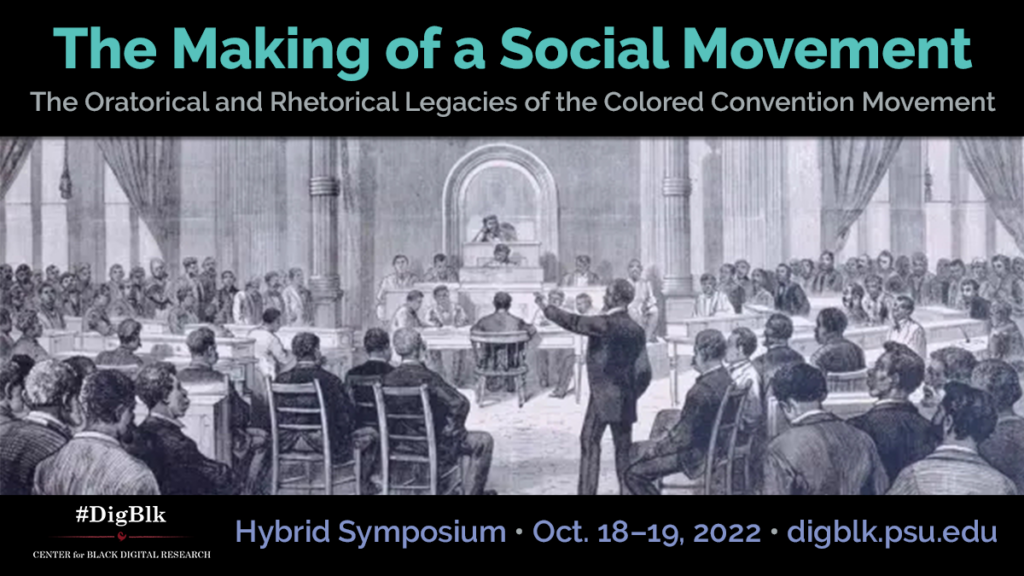CFP: The Making of a Social Movement: The Oratorical and Rhetorical Legacies of the Colored Convention Movement
The deadline for submissions has passed. Learn about the upcoming symposium at coloredconventions.org.
Call for Proposals due July 1, 2022.
The Colored Conventions Project at the Center for Black Digital Research will host a hybrid symposium that will focus on the rhetorical artistry and dynamism that made up the Colored Conventions and Black nineteenth-century America. This event builds on the first scholarly gathering on the Colored Conventions in 2015 and the subsequent volume The Colored Conventions Movement: Black Organizing in the Nineteenth Century (UNC Press). We invite papers that not only examine specific orators and their oratory, but we also welcome papers that offer rhetorical studies of the convention themselves. We also invite scholars to examine how delegates constructed and refuted arguments, how they debated with each other, and how they went about establishing the Black rhetorical tradition.
As both the digital project and edited collection remind us, the “Colored Conventions reflect the long history of collective Black mobilization before, during, and long after the end of the Civil War. As empowering hubs of Black political thought and organizing, the Colored Conventions provided space for informed public audiences to develop political plans and community-building projects, celebrate racial unity and protest state violence, and work tirelessly to secure Black people’s civil rights.” As Richard Allen in his address at the very first convention held in Philadelphia in 1830, one of the main reasons they met was to “obviate these evils.” It is this understanding of the Colored Conventions that makes them prime sites for the study of rhetoric.
Knowing that the convention minutes did not include speeches by women, as we did before, we also want to “highlight the organizational work of Black women who have been largely erased from convention minutes and hope to account for the crucial work done by women in the broader social networks that made these conventions possible.”
We also welcome papers that explore:
- The making of the Black rhetorical tradition
- Rhetorical histories of the Colored Conventions
- Interconnected Black rhetorical traditions
- Black women’s places, spaces, and rhetorics
- Literary societies, lyceums, and rhetorical education
- Black rhetoric in the nineteenth century
- Black trauma
- 19th century Black women rhetoric and public address
- Key debates, issues, and conversations
- Black intellectual history and the conventions
- Rhetorical trajectories of a person, thought, or ideas
- Rhetoric(s) of place, time, and space
Proposals should include a description of the proposed paper (250-300 words) and a brief (no more than 3 page) CV submitted through our Google Form by July 1, 2022. Applicants will be notified by July 15, 2022. Organizers plan to consider papers from the symposium for publication in an edited collection. Please indicate your interest in possible publication in your proposal. Please email digblk@psu.edu with any questions.
Timeline
May 2, 2022 Call for Proposals Opens
July 1, 2022 Proposals due
July 15, 2022 Applicants notified
Sept. 20, 2022 Presented papers due
Oct. 20-21, 2022 Present at symposium
Background
Having already successfully launched its Digital Humanities project in 2015, the Colored Convention Project hosted its first symposium on the Colored Conventions. Titled “Colored Conventions in the Nineteenth Century and the Digital Age,” the aim was to “pose questions about the ways in which scholarly paradigms shift when the decades-long colored convention movement is considered with abolition as a principal axis that orders historical understandings of nineteenth-century racial and justice movements.” Papers delivered over the two-day period engaged questions of “the politics of race and gender in the movement,” “Black activism’s social networks,” “historiography and periodization,” and “the importance of physical space, black churches, and halls.” The symposium introduced scholars of various disciplines to the all but forgotten Colored Convention Movement. It also led to the publication of The Colored Conventions Movement: Black Organizing in the Nineteenth Century, the “first collection of essays to examine the seven-decade history” of the Colored Conventions.
